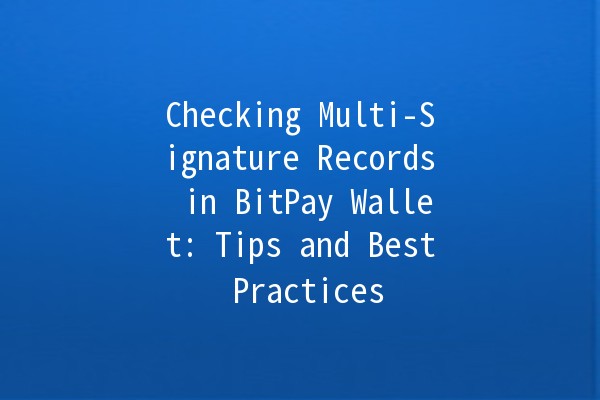




In the realm of cryptocurrency management, security is paramount. One of the key features that enhance security in digital wallets is the multisignature (multisig) setup. This method requires multiple private keys to authorize a transaction, which significantly mitigates risks associated with unauthorized access. For users of BitPay Wallet, understanding how to view and manage multisignature records is essential. In this article, we will explore practical tips and techniques to effectively navigate this process while enhancing your productivity.
Before diving into practical tips, it is crucial to comprehend what a multisignature wallet is. A multisignature wallet is designed to require two or more signatures (private keys) to execute a transaction. This adds an extra layer of security, particularly beneficial for businesses or groups managing funds collectively. By using a multisignature arrangement, even if one key is compromised, the funds remain secure.

The first step is logging in to your BitPay Wallet account. Make sure you have your credentials ready, as you will need them to access your wallet securely.
Once logged in, follow these steps:
Go to Wallets: From the main dashboard, locate the "Wallets" section.
Select MultiSig Wallet: If you have multiple wallets, select the multisignature wallet specifically.
Within your multisignature wallet, you can view all transactions requiring multiple signatures. Look for the “Transactions” section:
Identify Pending Transactions: These are transactions that require approvals from other participants.
Check Transaction History: Review completed transactions for accountability.
Managing multisignature wallets can be complex, but employing certain techniques can streamline the process:
Enable notifications for any transaction requiring your signature. This will help you stay informed and act promptly. BitPay Wallet provides customizable alerts for your transactions.
Application: Go to the settings menu, and toggle on notification options for transactions. This ensures you receive realtime updates.
When managing a multisignature wallet with multiple participants, it's beneficial to keep a shared document detailing:
Transaction History: Keep a record of all transactions, including amount and participants involved.
Signatures Required: Clearly outline who needs to approve each transaction.
Application: Utilize Google Docs or Sheets for realtime collaboration among your team.
Hold scheduled meetings with all parties involved in the multisignature wallet. This helps streamline the process of approving transactions and discussing any necessary actions.
Application: Establish a weekly schedule (or as needed) for brief meetings to review pending transactions and make decisions.
Enhancing everyone’s understanding of how to manage the multisignature wallet can greatly improve efficiency. Consider organizing training sessions to cover:
Wallet Functionality: Ensure everyone understands how to navigate and utilize the wallet.
Security Best Practices: Educate on the importance of security measures in cryptocurrency management.
Application: Use video conferencing tools for remote training sessions, especially if your team is distributed across different locations.
Create a clear approval workflow for all transactions. Define roles and responsibilities among users, setting expectations for how quickly each person needs to respond to transaction requests.
Application: This could be a simple flowchart created and shared within your team, detailing the approval process from transaction initiation to completion.
A multisignature wallet is a type of digital wallet that requires multiple private keys to authorize a transaction. It is important because it significantly enhances security by distributing trust across multiple parties, reducing the chances of unauthorized access and theft.
To add participants, navigate to the wallet settings within BitPay Wallet. Look for the “Add Participant” option and enter the required details for each new participant. Ensure everyone involved understands their responsibilities regarding transactions.
Losing a private key can be concerning. If your multisignature configuration includes more signatures than are strictly necessary for access, you may still be able to recover your wallet. Otherwise, you might need to recreate the wallet from scratch and reestablish trust relationships with the remaining participants.
Yes, the BitPay Wallet mobile application allows users to view transaction details on the go. Simply open the app, and follow the same navigation procedures as on the desktop version to access your multisignature records.
To maximize security, regularly review your wallet settings, change passwords, and ensure that all participants are educated about safe practices regarding key management. This includes not sharing keys via insecure channels and using hardware wallets where possible.
If a participant wishes to leave, you may need to adjust the number of required signatures. This can be done through the wallet settings. Make sure to conduct a transaction that does not require insights from the departing participant, and carefully transfer responsibilities to ensure all remaining participants are secure in their roles.
Harnessing the power of multisignature wallets in BitPay can significantly enhance your cryptocurrency management efforts. By implementing these productivity techniques and regularly reviewing transaction records, you can ensure a secure, efficient, and collaborative environment for managing digital assets. Always remember that security and clarity in processes are your best allies in the world of cryptocurrency.